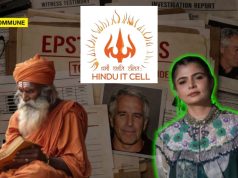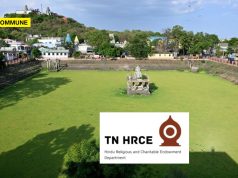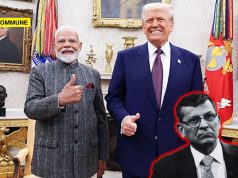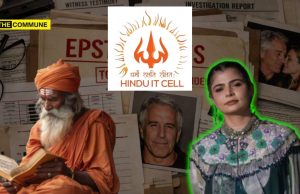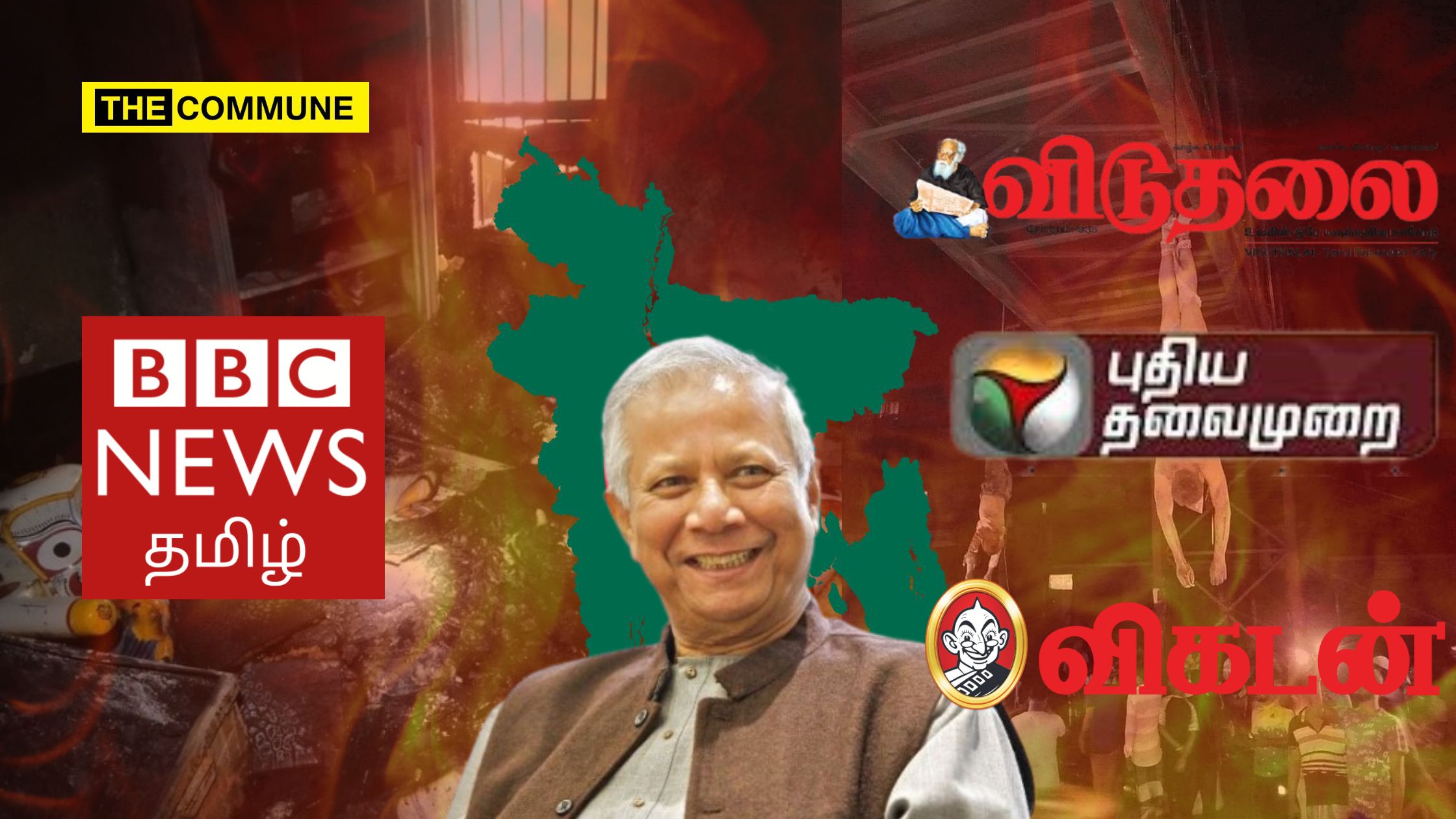
The selective reporting by the Dravidianist media has exposed a troubling bias, prioritizing DMK’s pro-Palestine agenda while ignoring the brutal violence faced by Hindus in Bangladesh. Even as minority communities in Bangladesh endure arson, looting, and targeted attacks, the Dravidianist media amplifies narratives aligning with DMK’s political strategy, portraying a false picture of peace.
DMK Solidarity With Palestine, Not Bangladesh
In an attempt to bolster support among minority Muslims in the state and consolidate their vote bank, the DMK has once again displayed solidarity with the Palestine issue. During the Parliament’s question hour, DMK MP Tiruchi Siva questioned why India abstained from the UNGA resolution—a matter that has no direct impact on India’s economy or geopolitical stability.
At the same time, it is shocking and concerning that the DMK government has either neglected or deliberately overlooked the plight of Hindus who face large-scale looting, arson, and daily attacks. This contradiction raises questions about whether this is a genuine concern or merely a political strategy.
Even during this regime, the judiciary had to intervene to grant permission for protests supporting Hindus suffering in neighboring Bangladesh. Despite this, when demonstrations were held, the government arrested the protesters—a deeply troubling situation that highlights the government’s apparent bias against Hindus under the guise of politics.
The situation does not end here.
DMK Ignoring Minority Plight In Bangladesh
Following the political lead of the DMK, the Dravidianist media, with no shame, relentlessly promoted Muhammad Yunus as the successor to Sheikh Hasina after her ousting as the Prime Minister of Bangladesh on 5 August 2024. He was presented as a paragon of virtue, emphasizing his role as the founder of the Bangladesh Grameen Bank and his status as a Nobel Prize laureate, has also displayed its bias.
However, in the aftermath, the media fell conspicuously silent. Coverage of Bangladesh all but disappeared, despite the rampant violence against minority communities—Hindus, Buddhists, and Christians—that followed. Reports detail widespread attacks on homes, businesses, and temples belonging to these communities. Local organizations, such as the Hindu Buddhist Christian Unity Council, have documented these incidents, which have sparked global outrage, particularly among Hindu communities.
Ground Reality In Bangladesh
Social media has been inundated with distressing accounts from individuals with ties to Bangladesh. These accounts detail threats, assaults, and the destruction of properties and places of worship. This violence has resurfaced deep-seated resentments that date back to the 1971 Bangladesh Liberation War and even earlier. The lack of sustained media attention to these issues raises serious concerns about selective reporting and the disregard for the plight of minorities in Bangladesh.
Ground reports from Bangladesh indicate that the attacks against minority communities began on the afternoon of 5 August, with the first two days witnessing the most violence. Investigations conducted between 5 and 20 August revealed evidence of at least 1,068 homes and business establishments belonging to minority communities being damaged. Additionally, 22 places of worship were targeted during this period.
The majority of these attacks occurred in the southwestern Khulna division, where at least 295 homes and businesses were destroyed. Other affected regions included Rangpur with 219 properties damaged, Mymensingh with 183, Rajshahi with 155, Dhaka with 79, Barishal with 68, Chattogram with 45, and Sylhet with 25. Altogether, the total number of properties attacked reached 1,068.
This is not the first instance of widespread violence against minorities in Bangladesh.
Bangladesh’s History Of Hinduphobic Attacks
During the Awami League government in 2021, major attacks occurred during the Durga Puja celebrations. Between 13 October and 1 November that year, the Bangladesh Hindu Christian Buddhist Unity Council reported that 117 temples and puja pavilions were vandalized across 27 districts. Additionally, 301 homes and businesses were damaged or looted, and nine people lost their lives.
The recent violence has been widespread, affecting 49 of the country’s 64 districts, including 67 upazilas (sub-districts). In these areas, 546 damaged homes and businesses—51% of the total—were documented, with additional information gathered from various other sources. The attacks also extended to Christian, Ahmadiyya Muslim, and ethnic minority communities, indicating a coordinated campaign of violence.
Political analysts suggest that anti-government fundamentalist groups are orchestrating these attacks with the intent to eliminate minorities from the country, further deepening the communal divide.
And what was the response from the so-called Nobel laureate, Muhammad Yunus? He simply stated, “We aim to create a Bangladesh that is like one big family. This is the fundamental idea. There will be no divisions within this family, and the question of separation will not exist. We are all citizens of Bangladesh, Bangladeshis.”
Currently, Hindus wishing to celebrate Durga Puja in Dhaka have been faced with demands for a toll of 5 lakh Tk. Several temples in Dakop, Khulna, received anonymous letters threatening that the celebrations would not be allowed unless they paid a toll of Tk 5 lakh each. The letters, delivered to the leaders of various puja celebration committees, warned that failure to comply would lead to severe consequences. This is truly shocking.
ISKCON In Bangladesh Targetted
Recently, several ISKCON temples and centers in Bangladesh were destroyed in acts of arson. Between 2 and 3 a.m., miscreants set fire to these locations. The deities of Sri Sri Laxmi Narayan, along with all the items inside the temple, were completely destroyed. Additionally, another ISKCON Namhatta Center was set ablaze. The Shri Shri Radha Krishna Temple and the Shri Shri Mahabhagya Lakshmi Narayan Temple, part of the Hare Krishna Namhatta Sangha in Dhour village under Turag Police Station, Dhaka district, were also targeted. The fire was started by lifting the tin roof at the back of the temple and pouring petrol or octane.
In addition, last month, ISKCON monk Chinmoy Krishna Das, based in Dhaka, was accused of treason. He had been leading protests against the alleged atrocities committed against minorities in Bangladesh. These attacks escalated after the so-called Nobel laureate came to power in the country.
Even Nobel laureate Muhammad Yunus has advocated for the removal of ‘secularism’ from Bangladesh’s constitution, citing the fact that 90% of the population is Muslim. During hearings at the High Court last month on the legality of the 15th Constitutional Amendment. This position suggests that Yunus aligns more with fundamentalist views rather than being a genuine leader like Sheikh Hasina.
Dravidianist Media & Hindumisia
Below are examples of how the Dravidianist media have supported a leader who promotes hatred against Hindus in the state.
The Periyarist magazine Viduthalai not only supported the new interim prime minister, Muhammad Yunus, but also mocked the looted Hindu temples. It propagated the narrative that Adani Power was reducing electricity supply due to the change in regime rather than the government’s inability to make purchases.
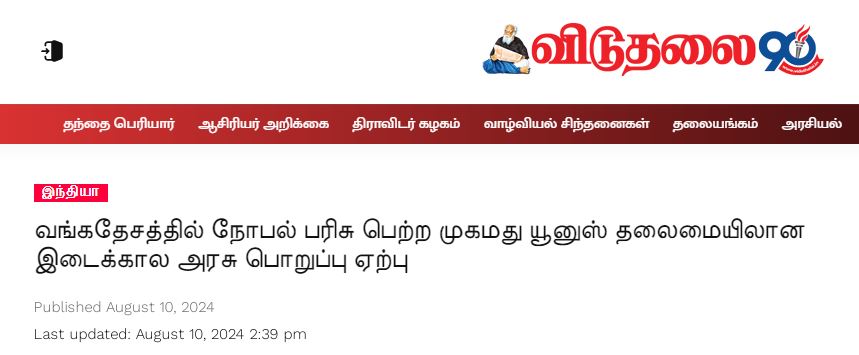

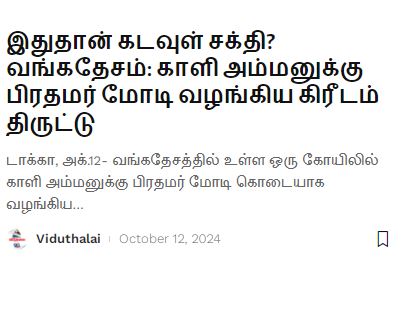
The BBC Tamil coverage was among the most shocking, consistently portraying Bangladeshi Hindus as content and peacefully living after Yunus came to power. It continues to push this narrative in the Tamil language. In a recent post, they shared a video claiming that Hindus in Bangladesh were happy and did not wish to be associated with Indian Hindus.

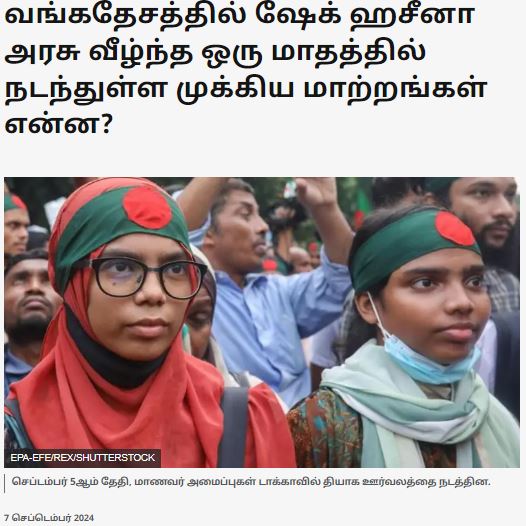

The Dravidianist media outlet Puthiya Thalaimurai News aired a report echoing Bangladesh’s stance, claiming that India’s concerns about the plight of Hindus in the country were baseless.

Vikatan, another Dravidianist media outlet, pushed its narrative to the next level in a video segment by questioning whether minorities in Bangladesh were truly affected. They alleged that ISKCON monk Chinmoy Krishna Das, who was arrested, had been implicated in a child abuse case. At the same time, they hypocritically welcomed the stance of stand still agreement on the Israel-Palestine war.
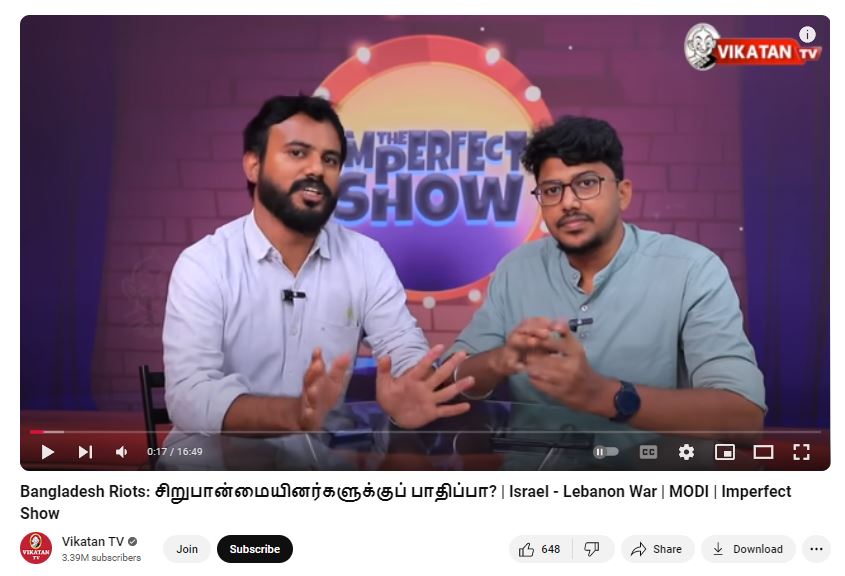
From this, it can be concluded that no news media in the state dares to deviate from the narrative set by the ruling DMK. Even when confronted with the truth, they choose to comply and align with their political masters, prioritizing loyalty over integrity.
(With inputs from Maridhas)
Subscribe to our channels on Telegram, WhatsApp, and Instagram and get the best stories of the day delivered to you personally.

